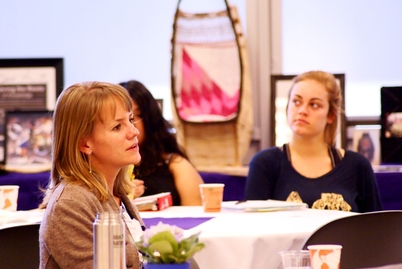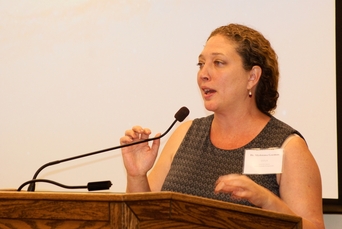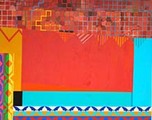NAS Graduate Students Host Excellent Symposium at UC Davis
by Corinne Bancroft

One such vital theme was the importance of indigenous knowledges in a context where western epistemology often reenacts the violence it made possible in the first place. For instance, on the first panel, Vanessa Esquivido explained that her tribe had to resort to racist 19th- century newspapers reporting on massacres of Native people to attempt to fulfill present day criteria of Federal Recognition. The conference and its presenters asserted that knowledge exists and can be gathered among tribal groups and traditions as suggested by the words “it’s a good day to gather knowledge” in the Symposium’s art contributed by Professor Hulleah Tsinhnahjinnie (Taskigi/ Diné).
Indigenous knowledges provide constructive alternatives to the problems caused and perpetuated by nation-states. Stephanie Lumsden’s critique of the prison industrial complex in the United States argued that her tribe, the Hupa, lived together for centuries without ever putting a human in a cage. Significantly, Indigenous ways of knowing not only offer more restorative paradigms for justice, but also for maintaining balanced communities. In her presentation, Cutcha Risling Baldy corrected much flawed anthropological studies that sought to inscribe western taboos onto Native traditions and showed how the initiation ceremonies of the Hupa people provide ways of valuing women. Yvonne Sherwood discussed how conflicting epistemologies can play out in academia and made incisive arguments for the value of experiential knowledge shared through story.

Professor Steve Crum, the chair of Native American Studies at UC Davis, opened both days of the conference with remarks about his own research and the importance of Native scholars in academia and he concluded each opening address with songs. Keynote speakers Victorio Shaw and Mishuana Goeman modeled what Native scholars can do in and out of the academy. After earning his law degree from UC Davis, King Hall, Shaw dedicated himself to serving tribes and Native peoples. In his Thursday keynote speech, he shared a moving story about how, in his path towards this vocation, he turned obstacles into switchbacks, so he could continue climbing.
The program not only featured exciting scholarship from diverse places and disciplines but also emphasized and incorporated artistic work. The banquet and creative hour featured the talented animation of Angel Hinzo, a reading from a soon to be published collection of short stories by Cutcha Risling Baldy, poignant recordings and photography by Vanessa Esquivdo, and an interactive map by Wayne Marci.
The planning committee did an excellent job not only of organizing a conference where graduate students could feel comfortable presenting and sharing our projects but also of setting a professional and inspiriting tone for a field, that because of scholars like these, will grow and flourish.

 RSS Feed
RSS Feed

